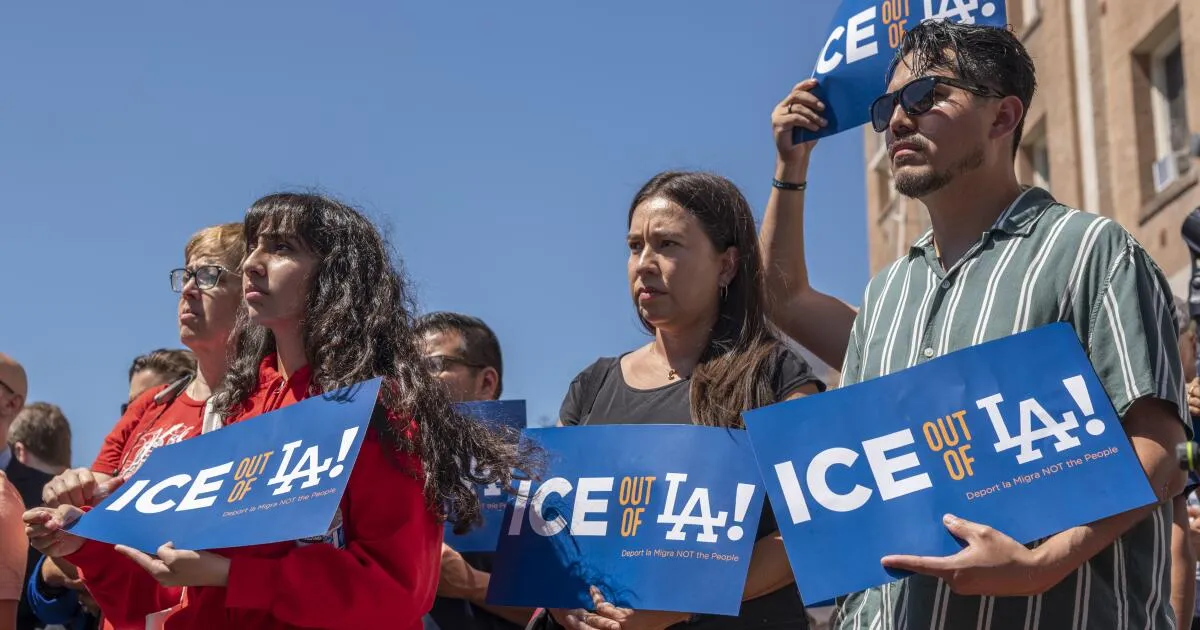
In a county where one in three residents are immigrants, a wave of anger and dread surged on Monday as noncitizens and their families confronted the grim reality that the immigration raids which disrupted their lives this summer could evolve into a persistent nightmare. The recent Supreme Court ruling has granted the federal government the authority to proceed with what critics describe as “indiscriminate” immigration stops, resulting in thousands of arrests and igniting days of protests throughout the Los Angeles area.
Following the ruling, the Department of Homeland Security (DHS) announced on social media that it would intensify its presence in Los Angeles, stating, “DHS law enforcement will continue to FLOOD THE ZONE.” This announcement has drawn widespread condemnation from immigrant rights groups, Democratic leaders, and legal advocates. Los Angeles Mayor Karen Bass labeled the decision as “dangerous” and an “attack on every person in every city in this country.” Governor Gavin Newsom echoed these sentiments, claiming that the “hand-picked Supreme Court majority just became the Grand Marshal for a parade of racial terror in Los Angeles.”
Many community members fear that federal agents may adopt even more aggressive tactics during the raids, which have already resulted in at least two documented fatalities. This ruling arrives on the heels of the Trump administration's commitment to escalate raids in sanctuary cities nationwide, including an imminent operation in Chicago. Maegan Ortiz, executive director of a non-profit supporting day laborers, stated, “They’ve been given carte blanche to go after anyone. My real concern is that it’s going to get ugly.”
In Los Angeles, the impact of these raids is felt acutely at locations such as car washes and Home Depots, which have been frequent targets for Border Patrol agents. Despite a federal judge's temporary halt on racially motivated sweeps, arrests have persisted. Pepe Morales, a 55-year-old father of four who has lived in the U.S. for 25 years, expressed, “Personally, this is persecuting me and my family. I’m worried how that’ll affect them psychologically.”
The ramifications of these raids extend beyond personal fears; they have deeply affected local economies. Business activity in many Latino communities has plummeted, with many businesses still struggling to recover. Community organizations have mobilized to provide food for immigrants who have retreated into their homes in fear. The administration touts its efforts to target “the worst of the worst,” yet analysis indicates that the majority of those arrested lack any criminal convictions.
In a statement, Tricia McLaughlin, a spokesperson for the DHS, described the ruling as “a win for the safety of Californians and the rule of law,” asserting that law enforcement would continue to arrest individuals deemed dangerous. Gregory Bovino, a senior Border Patrol agent, claimed that the operations are compliant with longstanding legal precedents, disregarding criticisms of the recent court ruling.
The decision is particularly alarming for those who rely on immigrant labor. Elizabeth Strater, a national vice president of United Farm Workers, highlighted the increasing necessity for employers to safeguard their workers amidst this climate of fear. “Every employer needs to take responsibility for protecting their workers’ rights,” she urged, emphasizing the importance of having protocols in place to shield workers from unwarranted immigration enforcement.
As of now, approximately 81 car washes have been raided, leading to the detention of nearly 250 workers, according to Flor Melendrez, executive director of the Clean Carwash Worker Center. “The raids are getting more violent; workers are getting hurt, workers are dying,” Melendrez asserted. This alarming trend has hollowed out entire commercial areas, contributing to a broader sense of insecurity within the community.
The Supreme Court’s ruling can be traced back to a lawsuit filed by the American Civil Liberties Union of Southern California and Public Counsel, which challenged the legality of the DHS's tactics. U.S. District Judge Maame Ewusi-Mensah Frimpong had previously issued a temporary ban on roving patrols that targeted individuals based on race or ethnicity. However, the Supreme Court's 6-3 decision to overturn this restraining order signifies a potential shift in how immigration enforcement will proceed.
As communities brace for the repercussions of this ruling, individuals like Angel Pineda, a Honduran immigrant seeking work, face an uncertain future. “Now, it’s going to be even more complicated,” he lamented, reflecting the pervasive anxiety that has gripped the immigrant population in Los Angeles. With each enforcement action, the number of day laborers who show up dwindles, as fear and apprehension cast a long shadow over their daily lives.
The ongoing situation underscores the urgent need for dialogue around immigration policy and human rights, as communities across the nation grapple with the ramifications of increased enforcement actions and the ongoing fight for justice and dignity for all individuals, regardless of their immigration status.